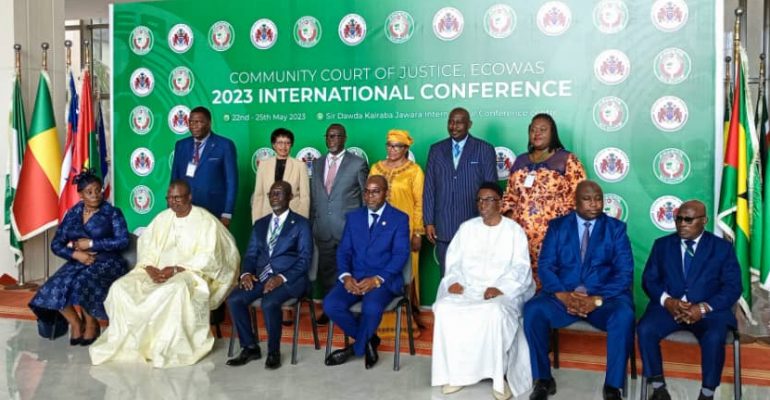INVOLMENT OF CITIZENS AND YOUTH, KEY TO SUCCESFUL DEMOCRACY IN ECOWAS MEMBER STATES
A panelist at the 2023 international conference of the ECOWAS Court, Professor Oumarou Narey, has cast doubt on the efficacy of West Africa’s constitutional convergence principles of 2001 as the panacea for ensuring political stability in the region following the resurgence of military dictatorships in the region compounded by efforts at tenure elongation by elected leaders.
The principles, which supplements the 1999 regional Protocol on the Mechanism for Conflict Prevention, Management, Resolution, Peacekeeping and Security, provides among other things, for popular participation in decision making, strict adherence to democratic principles and decentralization of power at all levels of governance while the armed forces must remain apolitical and under the command of a legally constituted politically authority. Moreover, no serving member of the armed forces may seek to run for elective political officer.
But in his presentation on the opening day of the conference on Monday, 22nd May 2023, Professor Narey argued that these principles, which were adopted in response to the spate of military interventions in the region in order to deter military adventurers and ensure the protection of constitutional order were inefficient. He added that these principles need reinforcement with additional measures that takes cognizance of current realities including the inclusion of youth in the implementation of the principles in order to ensure the holistic involvement of community citizens.
He then proposed the notion of a “regional constitution” which would be a constitutional model articulated around values supposed to establish new relations between States and their citizens with ECOWAS charged with the responsibility to operationalize the doctrine by generating common minimum standards that would be respected by all States.
He also noted that the region’s sanctions regime against governments that do not abide by these rules have not prevented neighbouring countries from embarking on the path of unconstitutional change of governments.
He also mentioned the intrusion of national armies in the democratic process through coup d’état. In fact, he said since 1975 when ECOWAS was established, only Senegal and Cap Vert have not endured military taking of power.
He advised ECOWAS Member States to insist on zero tolerance for critical matters like the limitation of presidential tenure, controversial revision of constitutions and corruption which are easily detectable or measurable.
He also urged regional authorities to strengthen national institutions, particularly constitutional jurisdictions and electoral commissions. He said the electoral commissions, being the ones organizing elections, should be made independent vis-à-vis the executive and the legislative arms of the government. He insisted on the role of the constitutional jurisdictions which are the last rampart against violation of the principles of the fundamental law.
Prof. Narey is professor of public law at the Abdou Moumouni University of Niamey in the Republic of Niger.

